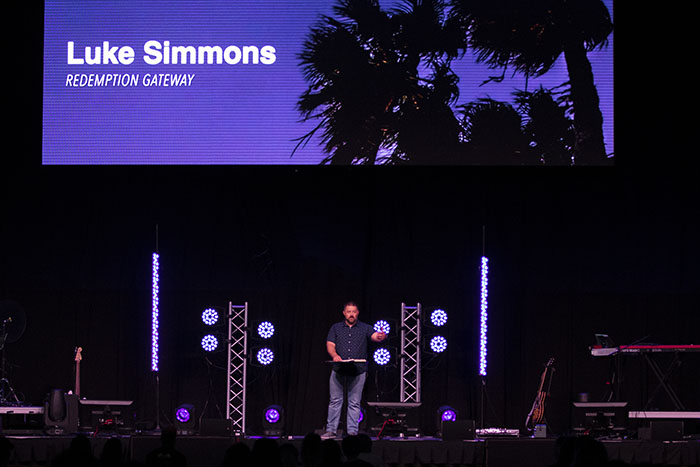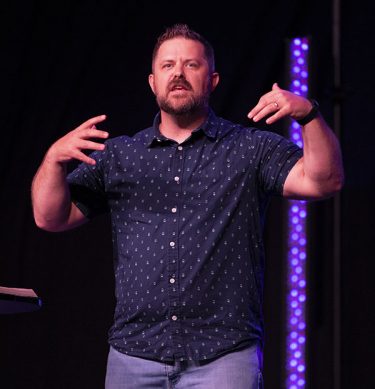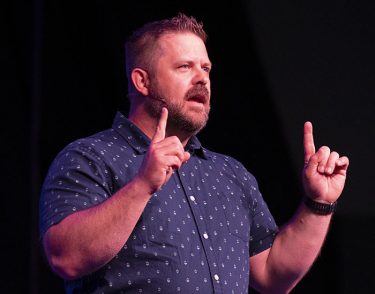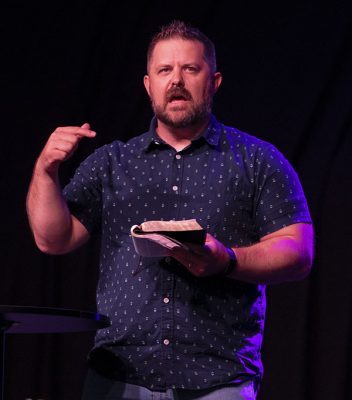
Story by Rick Vacek
Photos by Alan Cisneros
GCU News Bureau
The first thing Luke Simmons wanted his Chapel audience to understand is how Jesus’ message was viewed during His time on Earth, even by His followers.
“Here’s what we’re going to see in this passage today, that Jesus is hard to follow but that Jesus is our only hope,” the Lead Pastor of Redemption Gateway in Mesa said Monday morning at Grand Canyon University Arena.

The passage is John 6:60-71, a passage that God used to turn Simmons on to the Lord when he was a teenager. It’s the time when many of Jesus’ followers deserted Him:
On hearing it, many of His disciples said, “This is a hard teaching. Who can accept it?”
Aware that his disciples were grumbling about this, Jesus said to them, “Does this offend you? Then what if you see the Son of Man ascend to where He was before! The Spirit gives life; the flesh counts for nothing. The words I have spoken to you — they are full of the Spirit and life. Yet there are some of you who do not believe.” For Jesus had known from the beginning which of them did not believe and who would betray Him. He went on to say, “This is why I told you that no one can come to Me unless the Father has enabled them.”
From this time many of His disciples turned back and no longer followed Him.
“You do not want to leave too, do you?” Jesus asked the Twelve.
Simon Peter answered Him, “Lord, to whom shall we go? You have the words of eternal life. We have come to believe and to know that You are the Holy One of God.”
Then Jesus replied, “Have I not chosen you, the Twelve? Yet one of you is a devil!” (He meant Judas, the son of Simon Iscariot, who, though one of the Twelve, was later to betray Him.)
Simmons’ first mission was to define “hard.”
“This word ‘hard’ doesn’t mean it’s hard to understand. It doesn’t mean it’s confusing, it means it’s offensive,” he said. “You could also say this is a harsh saying, this is something that rubs me the wrong way, this is something that I don’t like.”
They were offended by several things, Simmons added.
First, He rejected their political hopes. When the Jews tried to make Him king after the miracle of the loaves and fishes, He retreated to the mountain by Himself.

“Has anyone noticed, by the way, that even today people are still trying to use Jesus for their political goals?” Simmons said. “… Whether you’re on the right or on the left, people are trying to use Jesus to actually accomplish what they really want.
“That’s what was going on here. They wanted a Jewish messiah who would be a military leader, who would help overthrow Rome.”
Simmons cited the words of noted speaker Tony Evans, who said, “Jesus didn’t come to take sides, He came to take over.”
Second, Jesus’ followers didn’t understand that He came to fulfill more than their physical needs, which Simmons equated to marrying someone for their money.
“That’s not the way we want to approach marriage, that’s not the way we want to approach relationship and that’s not how Jesus wants to be approached, and yet so many of us, that’s what we do,” he said. “We go, ‘Jesus, I like Your blessings, I like Your kindness, I like Your gifts, aaaaaah, I don’t know if I want You.'”
Simmons asked an interesting question: If you could be guaranteed going to heaven and having everything you love but God wasn’t there, would you still want it? He admitted that when he first heard the question, he thought it might be OK. But the Holy Spirit made him realize that it would be the equivalent of trying to marry God for His money.
Finally, Simmons theorized that the main reason that Jesus frightened His followers was because He was just too extreme.
“A lot of us, we don’t want to be extreme. We want to be moderate, we want to be in the center,” Simmons said.
In particular, what was extreme to the Jews was when He told them they would need to eat His flesh and drink His blood. His explanation and their consternation are explained in John 6:40-54:

And this is the will of Him who sent Me, that everyone who sees the Son and believes in Him may have everlasting life; and I will raise him up at the last day.”
The Jews then complained about Him, because He said, “I am the bread which came down from heaven.” And they said, “Is not this Jesus, the son of Joseph, whose father and mother we know? How is it then that He says, ‘I have come down from heaven’?”
Jesus therefore answered and said to them, “Do not murmur among yourselves. No one can come to Me unless the Father who sent Me draws him; and I will raise him up at the last day. It is written in the prophets, ‘And they shall all be taught by God.’ Therefore, everyone who has heard and learned from the Father comes to Me. Not that anyone has seen the Father, except He who is from God; He has seen the Father. Most assuredly, I say to you, he who believes in Me has everlasting life. I am the bread of life. Your fathers ate the manna in the wilderness and are dead. This is the bread which comes down from heaven, that one may eat of it and not die. I am the living bread which came down from heaven. If anyone eats of this bread, he will live forever; and the bread that I shall give is My flesh, which I shall give for the life of the world.”
The Jews therefore quarreled among themselves, saying, “How can this Man give us His flesh to eat?”
Then Jesus said to them, “Most assuredly, I say to you, unless you eat the flesh of the Son of Man and drink His blood, you have no life in you. Whoever eats My flesh and drinks My blood has eternal life, and I will raise him up at the last day.
“These Jews, they didn’t eat any food that had blood in it,” Simmons said. “Blood was considered sacred, blood was considered the thing that the life was in. The idea that you would eat the blood, especially that you would eat human blood, drink human blood, that’s nuts. … Some people said, ‘Oh, He must be advocating a kind of cannibalism.’”
It’s not what Jesus meant, of course.
“What this is saying … is that believing in Jesus is so significant and it’s so serious and it’s so important, that it’s like eating His flesh and drinking His blood,” Simmons said.
“To believe in Jesus is not to just sprinkle Him into your life. It’s not to just make Him your co-pilot. To believe in Jesus is actually to take Him into you that He is your nourishment and He is your sustenance and He is your flavor and He is your joy and He is your … everything. And, friends, let me tell you, that is extreme.”
Simmons closed by telling two stories.
He explained how, at age 17, he came to follow the Lord thanks to a mentor who challenged him to do more than just try to use Jesus to get what he wanted.
Simmons said he was angry, but “deep down, I knew he was right.”
The idea that Jesus doesn’t give us everything we want led Simmons to his other story, about the time his 4-year-old son wanted ice cream. Dad said no – and then watched little Hank collapse into his arms in tears.
“I found this to be amazing,” Simmons said. “I was the one who disappointed him. I was the one who didn’t give him everything he thought he wanted. And yet where else could he turn? There was nowhere else to turn.
“And this is what I found in Jesus is that, yes, it is hard to follow Jesus, yes, it is costly to follow Jesus, yes, you do not get a ‘genie Jesus’ who’s just going to do everything you want. But, oh, He’s our only hope. … Coming to Christ is not falling in love with the gifts of Christ, it’s falling in love with Jesus.”
Simmons closed by asking this hard question: “Are you using Jesus to get what you really want, or are you coming to Jesus open-handed, falling in His arms, and saying, ‘Jesus, you’re enough’?”
Contact Rick Vacek at (602) 639-8203 or [email protected].
****
Chapel replay
Next Monday’s speaker: GCU President Brian Mueller
****
Related content:
GCU Today: Chapel to feature reunions with speakers from past
GCU Today: Mackey links humility, prayer with story of Uzziah
GCU Today: Griffin centers Chapel talk on shifting margins
GCU Today: Chapel: Don't pass up lessons from life's offenses
GCU Today: Moore sets a high bar for Musical Worship Chapel
GCU Today: Demeter shows Chapel how faith can save you



































































